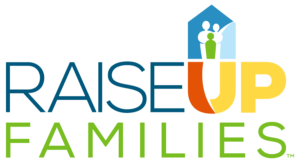

According to a 2022 report, 60% of Americans live paycheck to paycheck.
When this happens, unexpected financial hardships such as job loss, medical bills, car repairs, and high-interest loans create a downward spiral that makes finding financial stability almost impossible.
This financial insecurity often leads to frequent moves and school changes and a lack of access to necessary resources creating a generational cycle of poverty and struggle in which children suffer greatly.
At RaiseUp Families, we are committed to breaking that cycle with the help of caring, generous individuals. But understanding the contributing factors of financial insecurity is vital to the success of the effort.
In this blog, we’ll address seven factors that contribute to financial insecurity, barriers to receiving help, and 8 ways to find assistance on the path toward financial stability.
Let’s begin!
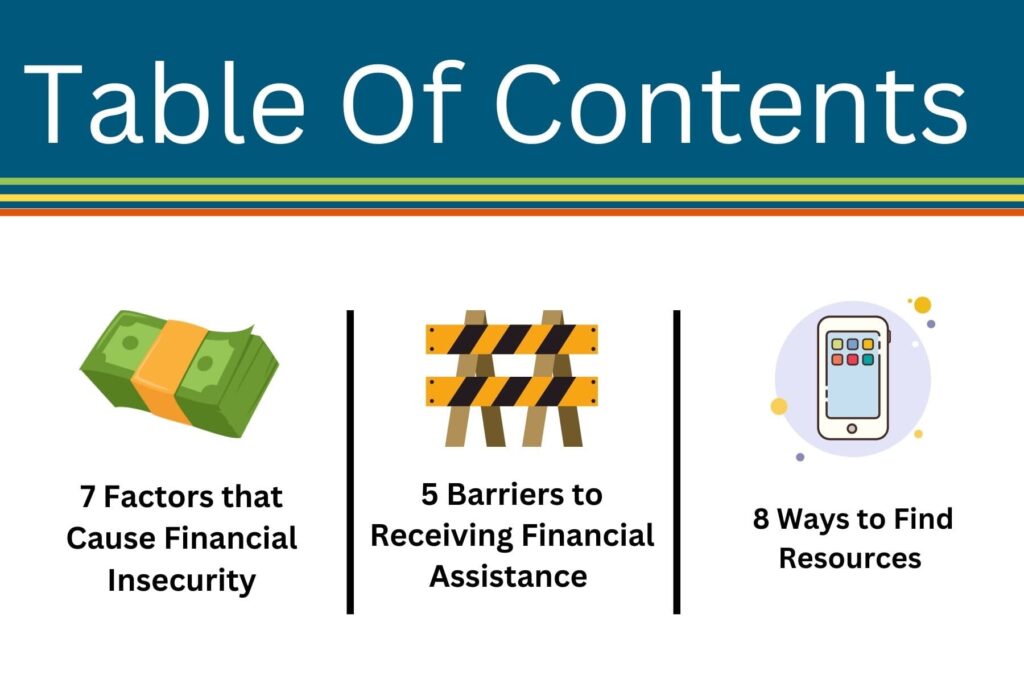
Families experience financial insecurity for many reasons. Sometimes these reasons are very complex. However, there are seven common contributing factors that are often present in cases of financial insecurity.
One significant contributing factor to families experiencing financial insecurity is the lack of financial literacy.
Financial literacy is defined as “the ability to understand and effectively use various financial skills, including personal financial management, budgeting, and investing.”
Although the United States is well known as the wealthiest country in the world, its financial literacy rates are abysmal. According to a recent study, 71% of American adults consider themselves financially literate. However, when actually assessed, they could correctly answer a mere 50% of the 28 basic questions on the TIAA Institute-GFLEC Personal Finance Index. Perhaps most telling is that 23% couldn’t answer more than seven questions correctly.*
According to the Milken Institute, the average financial literacy rate in the United States is scant 57%.
*These numbers are based on research done in 2022.
Why is financial illiteracy so rampant?
The most significant factor is that most states don’t require personal finance courses for graduation from high school. If families are from vulnerable communities, they are even less likely to have the means or access to financial literacy classes.
Beyond education in finances, many parents lack access to the education they need to be qualified for well-paying jobs that enable them to provide for their children.
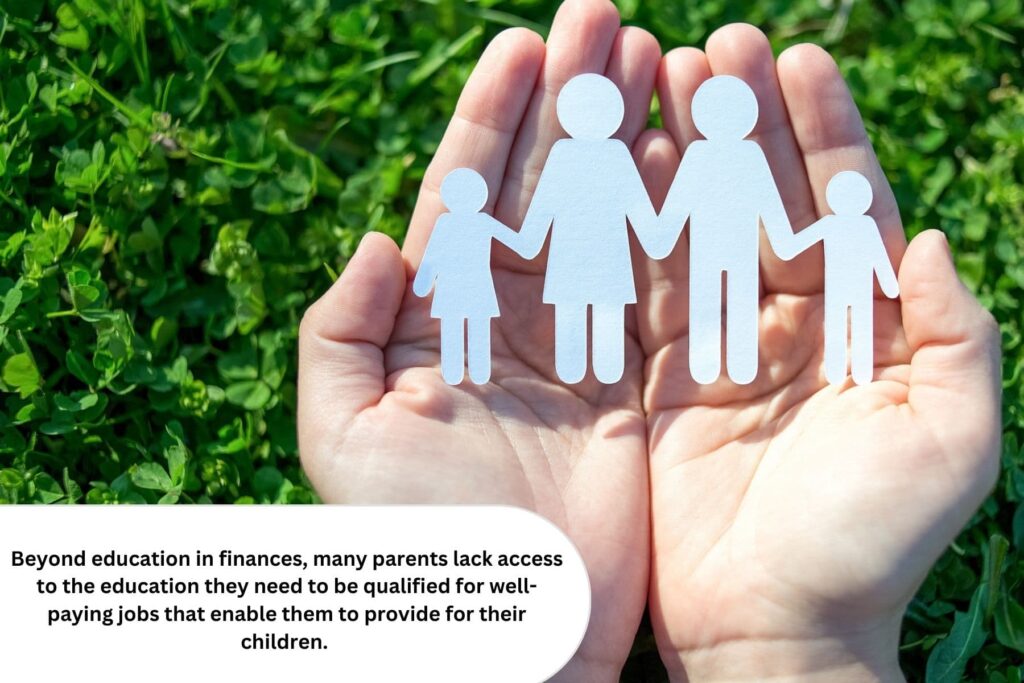
As we mentioned in the introduction, millions of Americans are barely staying afloat financially. When this is the case, an unexpected cost can mean there is no longer money for rent, food, or clothes. In these cases, children may be required to work to help support the family or take on household responsibilities that force them to grow up prematurely.
Many communities lack the necessary resources and social safety networks to mitigate financial insecurity and its effects. Examples of community resources include:
Many individuals find themselves in cycles with predatory resources such as payday loans, daily pay, Rhino Security Deposits, or Title 1 loans. While these loan services may appear helpful initially, they are not designed to help families get ahead. In fact, they are designed to help them simply get by financially, which causes greater and continued dependence.
Mental health factors can significantly contribute to financial insecurity. People facing mental health challenges like anxiety, depression, and unstable moods are at increased risk of spending for emotional reasons. Combine this with low income and lack of access to mental health services, and financial stress is probable.

Everyone has learned behaviors from their parents and grandparents. Many families have only been taught to use government assistance such as food stamps, public aid, and Section 8 housing. These resources are designed to help people just get by – not to help people get ahead. This creates a cycle of dependence on aid and poverty.
While resources are available for families facing hard times, there are often barriers to accessing that assistance. Let’s take a brief look at five of these barriers.
Many families simply don’t know how to navigate the system to find the help they need. This is especially true of families who didn’t grow up needing or depending on outside resources.
Many financial assistance programs are designed only for extremely impoverished families or those with eviction or disconnect notices. This leaves families who are working but still facing financial hardship stranded in a difficult middle ground and struggling to locate appropriate resources for support.
For some families, access to mental health services would provide a breakthrough in the journey to financial security. However, lacking income is among the greatest barriers to accessing mental health services. Most mental health providers only accept insurance or self-pay for services, and finding quality free services is challenging. Clinics that do provide free mental health services usually have long waiting lists for care.
In most communities, education is a necessary qualifier for getting a good job. In many cultures, individuals are encouraged to get a job rather than go to school.
Those who do want to go to school face huge challenges. A lack of income creates a significant barrier. Many families don’t have the finances to pay for college, and student loans can be predatory. Additionally, many first-generation college students lack knowledge about financial aid like grants, scholarships, and stipends that would help them avoid loans. They also tend not to have someone to lean on for support which can lead to poor financial choices and negative mental health outcomes.
Many people in low-income jobs are there because they lack the skills they would need for a better-paying job. Many times this lack of skills is because families don’t have access to the appropriate training that would equip them for better-paying jobs.
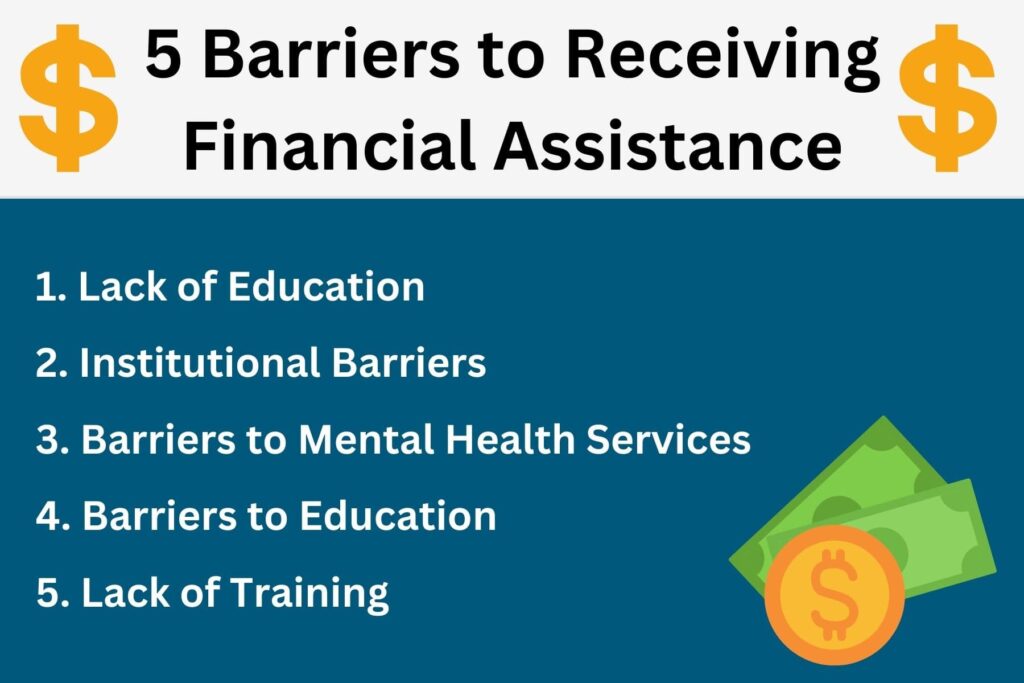
Knowing how to access resources is essential to reaching financial self-sufficiency. Here are eight ways to access resources if you or someone you love is in need.
If you are a parent of school-aged children living in the Houston area and facing financial insecurity, the team at RaiseUp Families is here for you. Through direct assistance and financial education classes, RaiseUp Families equips families to create a stable home for their children, unthreatened by school moves, homelessness, and hunger. The nine-month HandUp program offers the following services:
After graduating from HandUp, parents are eligible for the two-year AfterCare Program, which includes continued assess to financial education, counseling, budgeting classes, and support groups.
Please note: RiseUp Families is not an Emergency Assistance Program. For more information and to see if you or someone you know qualifies, please visit our Get Help page or call 713-973-8083.
One of the most basic ways to search for the resources available in your area is to use Google/Google Maps. This search format will help retrieve more accurate Google results: name of desired service/assistance needed + near me OR the name of your town, city, or county.
Here are a few example searches to demonstrate how this works:
School counselors are an excellent resource for connecting people to the help they need. We understand that bringing up these needs to a school counselor can be hard. But this is part of their job; they are there to help!

FindHelp is an online social care network that connects those in need with services available in their area. Simply go to findhelp.org and enter your zip code. You will then be taken to a page where you can select the category and sub-category of service you need. A menu will then allow you to choose a more specific service, e.g., “help pay for housing” or “credit counseling.”
Founded in 1887, United Way is a multinational organization that connects people in need with local resources. They have over 1,100 offices across the United States and around the world. United Way 211 is a help hotline available 25/7/365. Call 211 if you or someone you know needs assistance. For Houston/Harris County residents, check out the United Way Houston website for additional information.
Baker Ripley has been serving the greater Houston region and building communities since 1907. They offer varieties of services, including (but not limited to) education, job and career development, tax centers, and financial services. Reach out via the contact form on the website or by calling (713) 667-9400.
Harris County offers various financial & housing assistance programs through the Office of Social Services. These include emergency utility assistance, eviction defense, rental assistance, and more. Call 713-696-7900 for more information or to obtain help.
West Houston Assistance Ministries (WHAM) is a faith-based non-profit that has been serving West Houston since 1982. They offer a variety of programs, including
To contact WHAM, call 713-780-2727.
Another faith-based organization, Memorial Assistance Ministries (MAM), was founded by a joint effort of 13 local churches and a synagogue. MAM offers programs to create more stable families, a stronger workforce, and healthy, supportive communities. A sampling of their programs includes:
To contact MAM, call 713-574-7533.
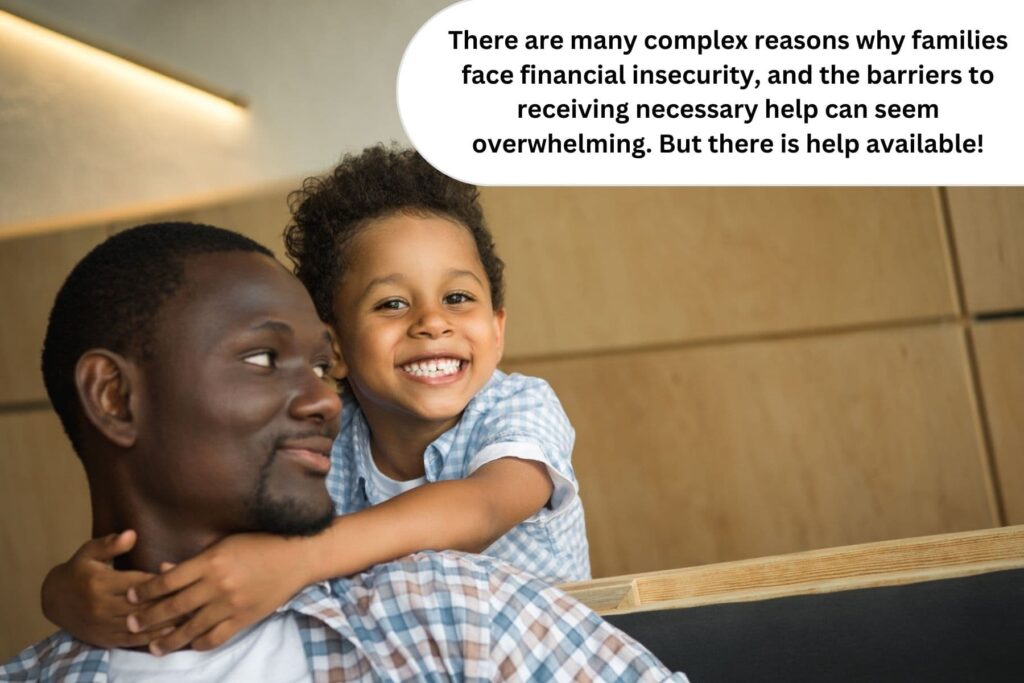
There are many complex reasons why families face financial insecurity, and the barriers to receiving necessary help can seem overwhelming. But there is help available!
At RaiseUp Families, we believe no family should ever need to experience the homelessness that can result from financial insecurity. As a parent, you deserve better. Your children deserve the opportunity for a better life. That’s why we provide direct assistance and financial education to parents of school-age children.
We hope this blog helps you understand more fully the various factors that influence financial insecurity and the avenues of help available. If you are a parent facing this situation, please don’t hesitate to reach out. If you are interested in partnering with us, please visit our Ways To Give page. As a 100% privately funded organization, we couldn’t do what we do without the generous support of others.
Here’s to a brighter future!
